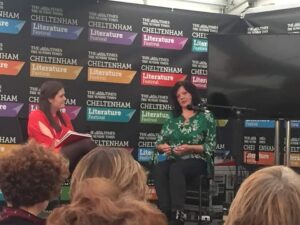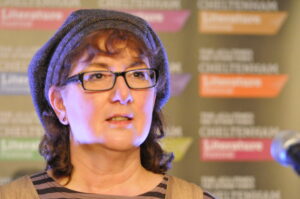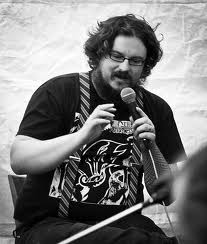
ALLi author Nicola Kelsall on stage at the Cheltenham Literature Festival
If you were inspired by our recent guest post by indie author Nicola Kelsall about her appearance at the prestigious Cheltenham Literature Festival, you may well be wondering how to pitch to festival organizers secure a similar gig yourself. In this extract from our campaign book, Opening Up to Indie Authors, by Dan
Holloway and Debbie Young, you'll find an outline of the best way to approach the most appropriate festivals for you and your books.
First, Pick the Best Festival
There is a growing number of litfests and book events springing up around the world, with different purposes and formats, so your starting point is to find a festival that's right for you. This isn't necessarily the one that's geographically closest.
Once you've worked out at which event you'd like to speak and what you'd like to deliver, write a letter (email) succinctly explaining why the session you wish to offer is ideal for this particular festival, and why you are the person to deliver it.

Dan Holloway performing his poetry at the Hawkesbury Upton Literature Festival (photo: Joanna Penn)
- Visit the festival website to enable you to understand its specific brief, how it is organised and how effectively its events are publicized.
- Examine previous programs to acquire a feel for preferred types of events.
- Consider how the program describes events to get an idea of the festival's audience.
- Connect your skills and interests to the festival in a meaningful way.
Online searching, particularly via Twitter and Google, is the best way to find the right festivals.
How to Pitch to Festival Organizers
The Submission Package
Compile a submission package that will make your chosen festival organizer want to book you. Rather like a manuscript submission package, this will consist of an all-purpose core of material that you can then adapt to make it specific to other festivals.
Your package should be a single document. You are selling about an hour of your time for a talk, workshop or panel discussion. To do that effectively, you need to demonstrate:
- what you have to say is of interest to festival goers
(this is the equivalent of the pitch) - you have enough well-thought-out-material to fill an hour
(not less and not more – this is the equivalent of the synopsis) - you are the best person to say this
(because when you're speaking direct to an audience, you matter)
With the above in mind, your package should include a pitch of 150-200 words on:
- what you intend to talk about
- what format your talk will take
- why this will be really interesting

Debbie Young performs her flash fiction at Cheltenham Lit Fest 2016
A good way to approach this is to describe it as it might appear in the festival program, with a single paragraph that will ensure your event is a sell-out. Then, outline the general areas you intend to cover in the order you intend to cover them. If you envisage doing anything other than a straightforward talk, this is the place to say that. This is important: variations in format can make an event really exciting and be a great selling point, but they can also be scary to organizers. If you will be using handouts, for example, state that you have a set of workshop materials that you will bring with you. A good festival will reimburse large photocopying costs, but no-one wants to find an overstretched volunteer to rush around to duplicate materials at the last minute.
“In my experience as an event organizer,” says Dan Holloway, “90% of writers turn up very nearly late, expecting to find access to a free photocopier, breezily holding a handful of sheets and saying ‘Oh, I assumed you'd be able to take care of that.' If, instead, you behave well and make their lives easier, organizers will clamor to have you back.”
AV or not AV?
Avoid slideshows/Powerpoint if possible. Laptops and projectors may be everywhere in your day job, but most festivals still struggle to find venues with adequate IT facilities. If your presentation is going to need AV, the organizers will look at their timetable and the number of available slots will instantly shrink. Every event organizer has tales of speakers making assumptions about IT that make them very unwilling to take risks. If you feel strongly that you need to work that way, discuss it after you've been booked.
Press Kit

Debbie Young thanking indie poets Dan Holloway and Shirley Wright at the 2016 Hawkesbury Upton Literature Festival (Photo by Joanna Penn)
Include your press kit with your application. You will be asked for it once you're booked, but it both sells you and shows a degree of professionalism if you offer one up front. The press kit is what the organizers will use along with your pitch to sell your event to the public and the media. It should contain the following:
- a relevant, persuasive bio that shows why you are the best person to give this talk, including previous public speaking experiences
- any relevant press reviews or references from previous events
- website links (to your personal website rather than to your books on retail sites)
- a publicity photo, ideally in high resolution (300dpi+) for print use and low resolution (72dpi) for the festival website
For More Information
For more information about the practicalities of working with festivals, read our campaign book, Opening Up to Indie Authors, which also includes valuable advice for indie authors on working with book retailers, reviewers, libraries, awards bodies and author membership associations. The ebook is free to download for paid-up members of the Alliance of Independent Authors (you'll find joining information here), and both ebook and print book are available to buy from all the usual outlets.
OVER TO YOU
Do you have any advice to add about how to get a gig at festivals?
Like to share a success story about your part in a lit fest or author event?
We'd love to hear about it!
OTHER POSTS ABOUT INDIE AUTHORS AT FESTIVALS & EVENTS
From the ALLi Author Advice Center Archive





Excellent advice. Thank you for sharing.